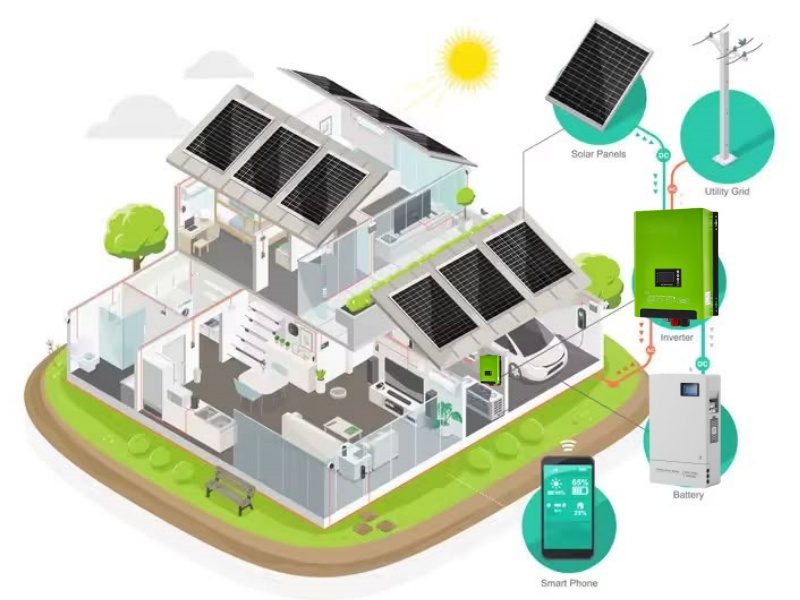When installing a solar power system, choosing the right solar inverter is crucial. The inverter not only determines the efficiency of the solar power system but also directly affects the system’s stability and lifespan. For solar product buyers, distributors, and wholesalers, understanding how to choose the right solar inverter is key to successful sales. This article will guide you on how to select the best solar inverter based on your needs to maximize your solar system’s return on investment.

What is a Solar Inverter?
A solar inverter is one of the core components of a solar power system. Its main role is to convert the direct current (DC) generated by solar panels into alternating current (AC) that can be used by household appliances or commercial devices. The inverter not only affects energy conversion efficiency but also directly impacts system safety and performance. Therefore, choosing the right inverter is essential for ensuring the efficient operation of your solar power system.
Factors to Consider When Choosing a Solar Inverter
1. Inverter Power Requirements
When choosing a solar inverter, the first factor to consider is the system’s power requirement. The inverter’s power should match the maximum output power of your solar panels. In general, the inverter’s power should be greater than or equal to the solar panel’s output capacity, which helps avoid overloads and reduces the battery’s lifespan.
Recommendation: Calculate the total power requirement of your system, and choose an inverter that fits. For example, if your system’s maximum power is 5kW, selecting an inverter with 6kW or higher capacity is ideal.
2. Inverter Efficiency
The efficiency of the inverter determines the overall power generation efficiency of the solar system. Modern inverters typically have an efficiency range of 80% to 98%. The higher the efficiency, the less energy loss occurs, resulting in better overall system performance.
Recommendation: Choose inverters with high energy conversion efficiency, especially those equipped with MPPT (Maximum Power Point Tracking) technology, which helps maintain optimal efficiency under varying light conditions.
3. Applicable Voltage
The inverter’s voltage range must be compatible with your solar panel system’s voltage. Common voltage standards include 12V, 24V, and 48V. Different voltage systems require different types of inverters.
Recommendation: Ensure the inverter supports the voltage of your solar system. For large commercial or industrial applications, choosing an inverter that supports higher voltages might be more efficient.
4. Types of Solar Inverters
There are various types of solar inverters, each suited for different applications. The main types include:
- String Inverters: These connect the solar panels to one inverter, suitable for small residential or commercial systems.
- Micro Inverters: Each solar panel is equipped with a micro inverter, ideal for scenarios requiring flexibility and optimized performance, especially in areas with uneven sunlight.
- String Inverters with Multiple Panels: These connect multiple panels to a single inverter, suited for medium-sized solar systems.
- Hybrid Inverters: These inverters not only convert solar power to AC but also integrate with battery systems for energy storage, ideal for users needing storage solutions.
Recommendation: Choose the right inverter type based on your needs. For residential users, string inverters or micro inverters may be suitable, while hybrid inverters should be considered for users with storage needs.
5. Protection Rating and Durability
Inverters are often installed outdoors, so it’s important to choose inverters with high protection ratings (such as IP65). Inverters with higher protection can resist rain, dust, and other harsh weather conditions.
Recommendation: If the inverter will be installed outdoors or in harsh environments, choose models with a high protection rating, such as IP65 or higher.
6. Brand and Certifications
Choosing a reputable brand is crucial as it directly impacts the inverter’s quality, reliability, and after-sales service. Additionally, ensure the inverter has the necessary quality certifications (such as CE, RoHS, FCC certifications), which are essential for safety and environmental standards.
Recommendation: Choose certified brands and products to ensure they meet international safety standards and environmental requirements, avoiding unnecessary risks due to quality issues.
Our Advantages: Factory Direct Sales, 2-Year Warranty
As a professional supplier of solar products, we not only offer high-efficiency, reliable solar inverters but also provide a 2-year warranty for customers, ensuring your investment is protected. We sell directly from the factory, cutting out the middleman, offering more competitive prices and customized services.
Our inverters have passed CE, RoHS, and FCC certifications, meeting international quality standards to ensure their safety and efficiency.
Get More Information or a Quote
If you are looking for high-quality solar inverters or have any product inquiries, please visit Yingke Solar or contact us directly for more information on solar products. Our solar inverters offer high efficiency, reliability, and have passed international certifications to meet your diverse needs. Request a quote today and become our distributor to start your solar business journey!






